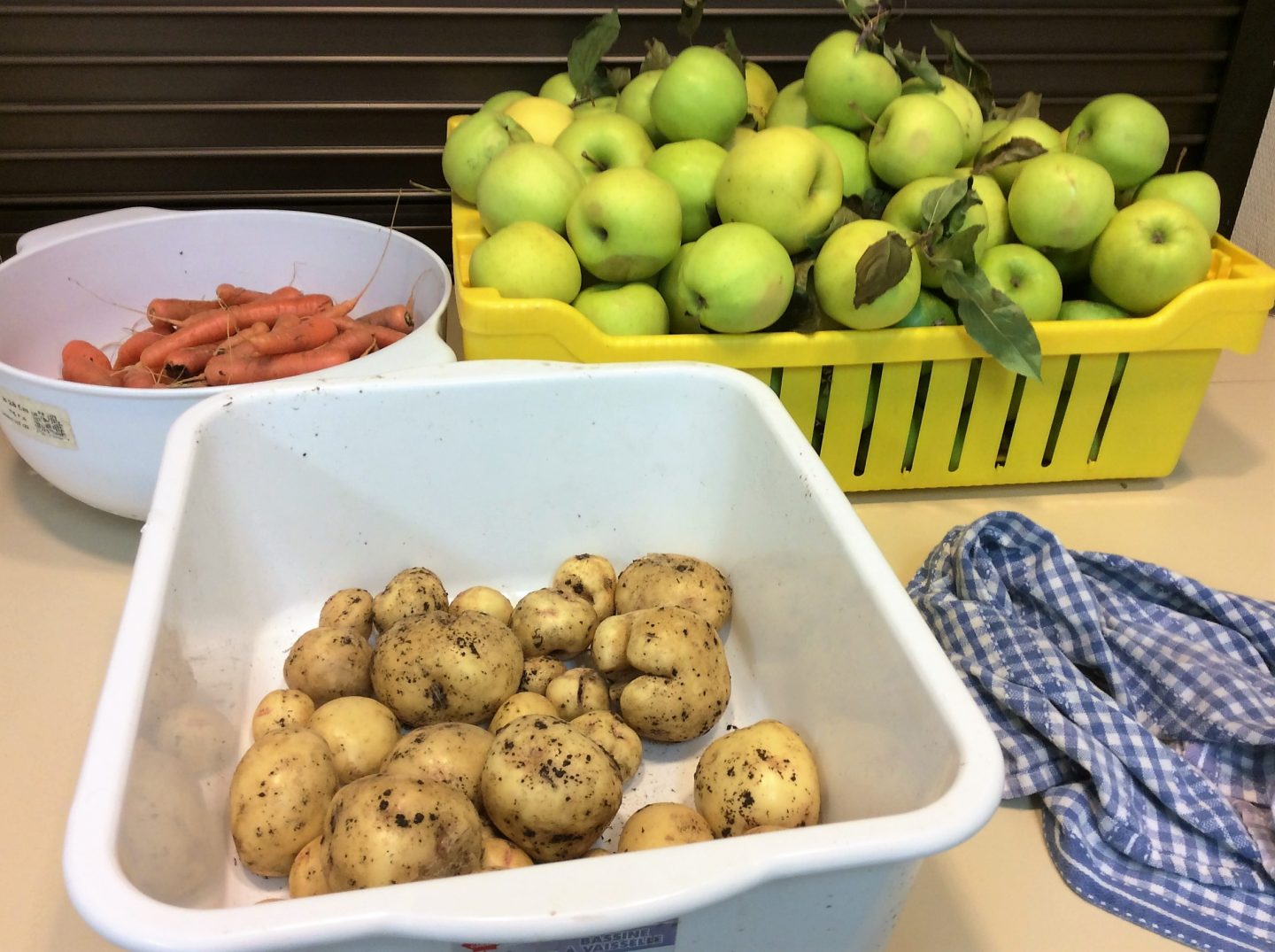Accomplishments: The installation of an incubator/starter school-community garden was a great success. Both students and community were able to experience hands on learning with seed starting indoors, transplanting to the garden and harvesting throughout the summer and into the Fall of 2015.
In particular, lots of carrots, potatoes, tomatoes, zucchini and spaghetti squash were harvested and used in recipes during the F2School Hot Lunch program.
A base requirement of at least 50% local grown product was more than able to be met with the combination of locally sourced produce, produce grown on site and local meat and protein products ie: chicken/turkey, beef and eggs. At times a meal would consist of 80% local products.
Challenges: Instituting a new food program that was different from what was traditionally offered ie: (PAC hot lunches) was a bit of a challenge, not only in terms of food on offer but the intent of the program to reinvest back in to curriculum or programming, rather than using this as a fundraising tool.
Going from a 1 day per week to 3 days per week as was set out in our original plan took some time to implement and wasn’t fully underway until January of 2016. However, we were able to keep costs down and still offer an average nominal charge to students. Prices ranged from pre-order costs; $3.00 for K-3; $3.50 for 4-7; $4.00 for adults /drop-ins/day of purchases.
F2School making a difference: Overall increase in nutrition with the lunch program and a breakfast program has benefitted students in several ways at Parkland Elementary; relationships and achievement being the two most important. These programs have improved relationships within our school community and supported students in bonding with each other and the adults in the building. Students have had opportunities to work in the kitchen preparing food and learned roles and responsibilities in helping look after younger kids and cleaning up. This relationship building has fostered a community of learners who know and care about each other, who are polite and who want to come to school for the social interaction and good meals.
A nutritious breakfast five days a week and lunch three days a week has made a difference by improving student achievement. Many of our students are bus students who don’t take the time in the morning to eat breakfast or pack a healthy lunch. Our Farm to School Program has allowed bus students and the general population to access the food needed to support learning and good health. Teachers have noticed differences in student readiness to learn, especially in the morning. Absenteeism and illness rates have decreased as a result of this program.
The teaching component of the Farm to School program has been another advantage of the program. Students have had the opportunity to be ‘Food Safe’ certified and learn the importance of managing and organizing food safely in a public facility. These skills will prepare them for the work force in the near future.
Community Involvement: Parkland Farm2School was able to purchase local foundation vegetables such as potatoes, carrots and onions from Koster’s Farm, local chicken/turkey from Walkin’ Acres, local beef from Hall’s Beef and a supply of farm eggs from nearby Kirby Hill Farm. It was surprising how much product was actually needed and product ran out by mid February.
The Parkland Farm2School Program was able to secure other funding for the continuation of the program. A grant for $1500 was received through IMAGINE (Northern Health Authority) for the purchase of indoor growing equipment. A grant for $750 was approved through North Cariboo Community Futures for a Young Growers Program which would supply seed money for a young entrepreneur program. (Students apply and receive funds for a start up project. Growing produce, purchasing laying hens for eggs etc.
Parkland Community Association secured an additional $3300 for the expansion of the community garden on the grounds of Parkland Elementary, through the Partnering 4 Healthy Communities-North Cariboo Project initiative.
Future Planning: Unfortunately School District 28 has chosen Parkland Elementary as one of three schools it will be closing by June 2016 in order to meet budget shortfalls.
There will be a transition of students to Barlow Elementary School which is in slightly closer proximity to the City centre of Quesnel.
The Student population is estimated to be approximately 180 students.
Parkland Elementary staff, administration and principal who will transition with students to Barlow, are looking forward to continuing with the development of the Farm2School program.
The Parkland Community Association hopes to continue with the community garden on the grounds of Parkland Elementary as the neighbourhood community works on a plan to use Parkland as a Community Centre.

